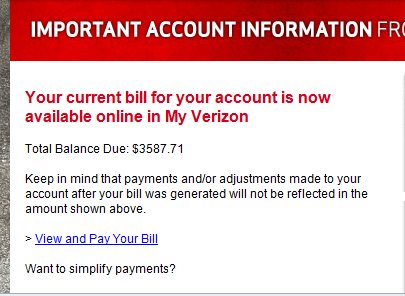Beware! - One must be very cautious when online. The Internet is a wonderful resource for research, certainly, but it is also a vast miasma of scofflaws eager to take advantage of you financially!
This email message appeared in my Outlook Inbox this morning. It certainly looks legitimate. It is nearly identical to the messages sent by Verizon Wireless.

GREED is often the first indicator one is dealing with a criminal. In this instance, it seems ridiculous that someone expects me to read the message and remit $3587.71! Nonetheless, if these scams did not work at least some of the time, they would soon fail to be sent.
There are several indicators for which one should look when determining the legitimacy of such emails:
Greed - Suspect any email that is based on greed—either the greed of the sender (as in the example above) or the greed of the recipient (the phony inheritance scams, banking scams, etc.)
Poor grammar - Suspect any email that contains misspellings, syntax errors, etc. Generally, these messages originate in non-English-speaking countries and are composed by people with poor language skills.
Companies with whom you do not do business - Obviously, any message that appears to be from a bank, wireless company, etc., with whom one has no account is a fraudulent message.
Reply or destination location - If you suspect an email, the quickest, simplest, and surest way to determine its legitimacy is by checking the reply or destination location. It is a simple matter to fake an email address so that a message appears to come from a trusted source (for example, "customerservice@microsoft.com), but the reply or destination location email address or URL will tell the true story. By hovering the mouse over links in an email, one can easily see where a reply will go or where a user will be taken by clicking a URL. Generally, the email address or URL will terminate in an extension indicating a server in a foreign land.
It is not yet 9 AM, and already this morning I have received six potentially dangerous emails.
